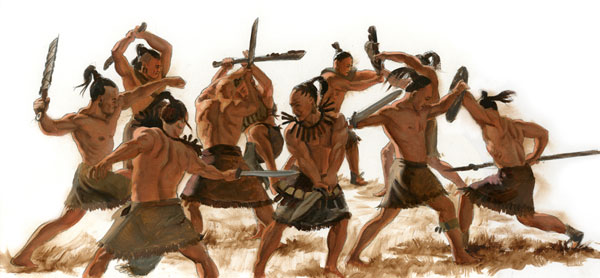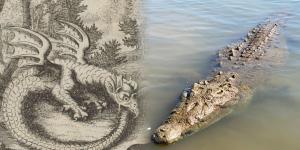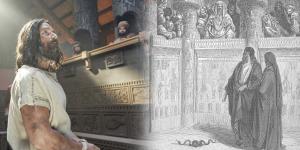You are here
How Do the Covenants in the Scriptures Apply to Me Today?

Mosiah 7:25
The Know
The Zeniffites, the people who returned to the land of Nephi from Zarahemla, faced many challenges. They constantly had to fight the Lamanites (Mosiah 10:10), suffered under an oppressive king, Noah, (Mosiah 11:2), and were forced to pay tribute to the Lamanites (Mosiah 19:26), before finally being delivered. Many of the afflictions the Zeniffites went through when they broke their covenants are the same afflictions promised to the Israelites if they broke their covenants. Thus, Mormon’s abridgment shows that the covenant God made with ancient Israel still applied to the Nephites.1
For example, when the elite Nephites broke their covenants through their oppression of the people and their immorality (Mosiah 11:13–15), “the Lamanites began to come in” upon the people of King Noah, “to slay them in their fields, and while they were tending their flocks ... and drove many of their flocks out of the land” (vv. 16–17). This is similar to what the Lord said would happen to those who broke their covenants in these ways: “Thine ox shall be slain before thine eyes, and ... thine ass shall be violently taken away from before thy face and ... thy sheep shall be given unto thine enemies” (Deuteronomy 28:31).2
Not only was their livestock threatened, but the people themselves were warned, that “except they repent ... I will deliver them into the hands of their enemies” (Mosiah 11:21), the same warning the Israelites received in Leviticus 26:25. Once this happened, they would be “oppressed and spoiled evermore, and no man shall save” them (Deuteronomy 28:29). Or, as Mosiah 11:23 puts it, “They shall be brought into bondage; and none shall deliver them, except it be the Lord, the Almighty God” (Mosiah 11:23). They would be “smitten before thine enemies” (Deuteronomy 28:25; Leviticus 26:17), or “smitten on the cheek; yea, and shall be driven by men, and shall be slain” (Mosiah 12:2).3
God told the Zeniffites that “insects shall pester their land also and devour their grain” (Mosiah 12:6). This is a fulfillment of Deuteronomy 28:38:
Thou shalt carry much seed out into the field and shall gather but little in; for the locust shall consume it. Thou shalt plant vineyards, and dress them, but shalt neither drink of the wine, nor gather the grapes; for the worms shall eat them (cf. Leviticus 26:20).
The resulting crop failure would lead to famine (Leviticus 26:26; Mosiah 12:4). And whatever food was left “shall a nation which thou knowest not eat up” (Deuteronomy 28:33; Leviticus 26:16). This was fulfilled when the priests of Noah came “into the land of Nephi by night and carried off their grain” (Mosiah 21:21).
The Zeniffites were told they would “be smitten with a great pestilence–and all this will I do because of their iniquities and abominations” (Mosiah 12:7). This is just what He promised in the Old Testament: “The Lord shall make the pestilence cleave unto thee until he have consumed thee from off the land, wither thou goest to possess it” (Deuteronomy 28:21; Leviticus 26:25). The Israelites were promised “all the diseases of Egypt” (Deuteronomy 28:60), and the Zeniffites did indeed experience “all manner of diseases” because of their wickedness (Mosiah 17:16).
In the aftermath of defeat in battle, their dead bodies would be eaten by “all fowls of the air, and ... beasts of the earth” (Deuteronomy 28:26), or as Mosiah 12:2 puts it, “the vultures of the air ... and the wild beasts, shall devour their flesh.” The Zeniffites were cursed with fear,4 contention,5 scattering,6 and destruction,7 such that only few of them would be left,8 just like the Old Testament said they would be.
The Why
The hundreds of years and thousands of miles between the writing of the Law of Moses and the time of the Zeniffites could have made some of them think that God’s covenants no longer applied to them. Nothing could be further from the truth. The Lord told the Israelites that “all these curses shall come upon thee, and shall pursue thee, and overtake thee, till thou be destroyed; because thou hearkenedst not unto the voice of the Lord thy God” (Deuteronomy 28:45). The Nephites knew this to be true: “if this people had not fallen into transgression the Lord would not have suffered that this great evil should come upon them. But behold, they would not hearken unto his words” (Mosiah 7:25).9
Yet the Book of Mormon shows that not only the curses of the Law of Moses applied to the Nephites. God would remember and bless His people if they repented.10 Leviticus 26:40–44 states:
If they shall confess their iniquity, and ... be humbled ... then will I remember my covenant with Jacob, and ... Isaac, and ... Abraham. ... I will not cast them away ... to break my covenant with them: for I am the Lord their God.
King Limhi may have had a verse like this in mind when he said, “But if ye will turn to the Lord with full purpose of heart, and put your trust in him, and serve him with all diligence of mind, if ye do this, he will, according to his own will and pleasure, deliver you out of bondage” (Mosiah 7:33).11
Part of the stated function of the Book of Mormon is that its peoples would “know the covenants of the Lord, that they are not cast off forever” (Title Page). The Book of Mormon not only shows that the covenants from the Old Testament applied to the people of the Book of Mormon, but that God’s covenants apply to us today as well.12 We will surely suffer if we reject the covenant, as the people in the Book of Mormon did, but we can also experience all the blessings of the covenant when we humble ourselves and turn to Him.13
Further Reading
S. Kent Brown, “Curse, Cursing(s)” in Book of Mormon Reference Companion, ed. Dennis Largey (Salt Lake City, UT: Deseret Book, 2003), 224–225.
Clyde J. Williams, “Deliverance from Bondage” in Mosiah, Salvation Only Through Christ, ed. Monte S. Nyman and Charles D. Tate, Jr., Book of Mormon Symposium Series, Volume 5 (Provo, UT: Religious Studies Center, Brigham Young University, 1991), 261–274.
Monte S. Nyman, “Bondage and Deliverance: Mosiah 7–8, 19–24,” in Book of Mormon, Part 1: 1 Nephi–Alma 29, Studies in Scripture: Volume 7, ed. Kent P. Jackson (Salt Lake City, UT: Deseret Book, 1987), 260–269.
Chart on Biblical Curses in Mosiah
|
Curses or Blessings |
Leviticus 26 |
Deuteronomy 28 |
Mosiah |
|---|---|---|---|
|
Flocks Violently Taken Away |
|
||
|
Delivered into Hands of Enemies |
|
||
|
No Man Save Them |
|
||
|
Blindness |
|
Mosiah 11:29 |
|
|
Smitten Before Enemies |
|
||
|
Slain |
|
||
|
Devoured By Wild Beasts |
|||
|
Crops Smitten |
|
||
|
Famine |
|
||
|
Pestilence |
|||
|
Fear and Lamentation |
|
||
|
Insects Devour Crops |
|||
|
Destruction and Desolation |
Mosiah 12:8 (8:8?) |
||
|
Diseases |
|
||
|
Scattered |
|||
|
Internal Bloodshed |
|
||
|
Enemies Oppress and Eat Up Fruit of Labor |
|||
|
Few Left |
Mosiah 21:17; (22:2; 25:9?) |
||
|
Pine Away in Iniquity |
|
||
|
Cursed Because did not Hearken to God |
|
||
|
God Will Remember If They Repent |
|
- 1. See S. Kent Brown, “Curse, Cursing(s)” in Book of Mormon Reference Companion, ed. Dennis Largey (Salt Lake City, UT: Deseret Book, 2003), 224–225.
- 2. For more on Deuteronomy 28 in the Book of Mormon, see Hugh Nibley, Teachings of the Book of Mormon, 4 vols. (Provo, UT: FARMS, 1993), 2:265.
- 3. For more on covenants like this in the Book of Mormon, see Book of Mormon Central, “Why Did Samuel Say the Lord ‘Hated’ The Lamanites? (Helaman 15:4),” KnoWhy 186 (September 13, 2016).
- 4. See Deuteronomy 28:67; Mosiah 21:9–10.
- 5. See Leviticus 26:37; Mosiah 7:25.
- 6. See Deuteronomy 28:64; Leviticus 26:17, 33; cf. Mosiah 17:17–18.
- 7. See Deuteronomy 28:20, Leviticus 28:63; cf. Mosiah 12:8.
- 8. See Deuteronomy 28:62; Leviticus 26:39; cf. Mosiah 21:17; 22:2; 25:9.
- 9. For more on the relationship between Deuteronomy and Mosiah, see Brant A. Gardner, Second Witness: Analytical and Contextual Commentary on the Book of Mormon, 6 vols. (Salt Lake City, UT: Greg Kofford Books, 2007), 3:251.
- 10. See Clyde J. Williams, “Deliverance from Bondage” in Mosiah, Salvation Only Through Christ, ed. Monte S. Nyman and Charles D. Tate, Jr., Book of Mormon Symposium Series, Volume 5 (Provo, UT: Religious Studies Center, Brigham Young University, 1991), 261–274.
- 11. For more on the theme of deliverance from bondage, see Monte S. Nyman, “Bondage and Deliverance: Mosiah 7–8, 19–24,” in Book of Mormon, Part 1: 1 Nephi–Alma 29, Studies in Scripture: Volume 7, ed. Kent P. Jackson (Salt Lake City, UT: Deseret Book, 1987), 260–269.
- 12. Knowing how God lived up to His covenants in both the Old Testament and the Book of Mormon can be directly relevant to us today: “The restoration of the past may well have a more powerful effect on the hearts and minds of men than the revelation of the future.” Joseph Fielding McConkie and Robert L. Millet, Doctrinal Commentary on the Book of Mormon, 4 vols. (Salt Lake City, UT: Bookcraft, 1987–1992), 2:189.
- 13. See Sherwin W. Howard, “Cursings,” in Encyclopedia of Mormonism, 4 vols., ed. Daniel H. Ludlow (New York, NY: Macmillan, 1993), 1:352.
KnoWhy Citation
Related KnoWhys
Subscribe
Get the latest updates on Book of Mormon topics and research for free







